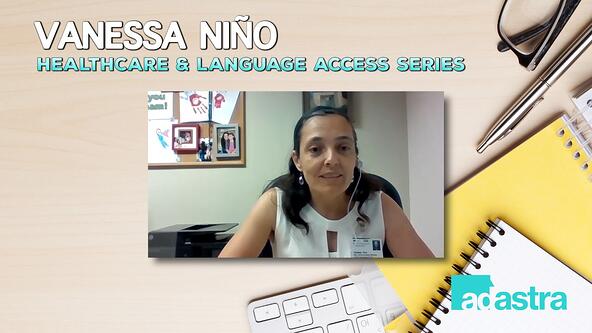Healthcare and Language Access Series: Vanessa Niño Interview – Part 2
Healthcare and Language Access Series

In a continuation of last week’s (Part 1) interview with MedStar Washington Hospital Center’s Vanessa Niño, we delve deeper into how COVID-19 has affected interpreters as well as the broader language services industry. As a Communications Services Manager who is also an interpreter, Niño shares her perspective on language access following her experience with the COVID-19 crisis.
Vanessa Nino, Communication Services at MedStar Washington Hospital Center
Emotionally Trying Times For Interpreters
Because interpreters typically aid in communication for patients for the entire duration of their hospital stay, starting in the emergency room, Niño describes how emotionally tough the high rate of death of COVID-19 patients has been on the interpreters. Interpreters get to know their patients as they communicate for them, and root for their recovery.
“Unfortunately, COVID has taken too many people. You have the young, the old, the middle-aged. A lot of them were taken. Every death that we had was definitely hard,” she said.
In contrast, however, there were happy moments for interpreters, namely when patients who had been seriously ill recovered and left the hospital. “Just being able to hear them say their name and respond to the conversation without struggling for air and just being strong again—every single one of those cases was absolutely amazing,” she said.
Further Adaptation of Telehealth For a Post-COVID World
Niño believes one positive result of COVID-19 is that telehealth will bring a lot of medical and healthcare access to people who need it by paving the way to visit virtually. In a post-COVID world, she thinks telehealth is here to stay. She says that at MedStar Washington Hospital Center, the telehealth call volume went from very few calls to thousands quickly, and “tremendously” helped provide medical care during such a difficult time. “The telehealth system is just incredible. I think it’s the way of the future,” she said.
Still, Niño cautions that telehealth may not serve every single medical need, and that some medical appointments cannot be accomplished by phone or video and should be done in-person.
Today’s Challenges In Language Access Services
Drawing on her long career developing and managing language access services for healthcare organizations, Niño also discusses the major issues that impact the efficacy of healthcare language access:
- Patients who need interpretation services who do not know they are available for them
- Inappropriate use of phone or video language system
- Difficulty in finding interpreters for rare, indigenous languages
In the interview, she describes how each of these areas of concern can adversely affect a patient because they are not getting the critical communication help they need. As a language access advocate, Niño explains how interpreters bridge the gap between doctors, patients, and families in ways that impact patient outcomes by fully and accurately conveying all information patients need during their hospital stay.
Check out Part 2 of our full length interview with Vanessa Niño below!




